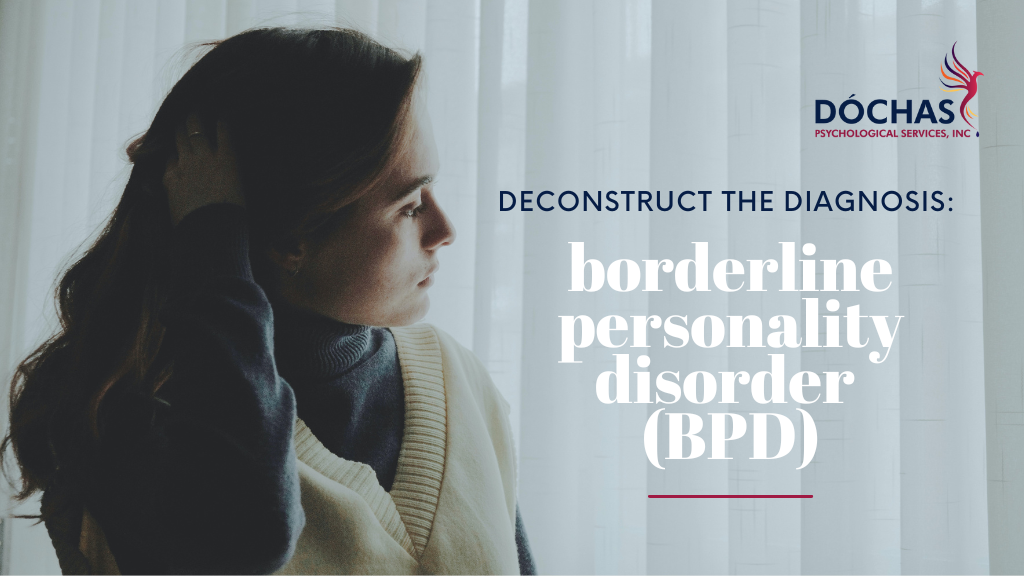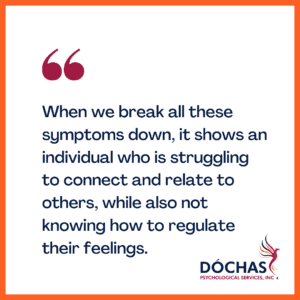Hi! It’s Jessica here on the Dóchas blog today, and I’m going to be doing a deep dive into borderline personality disorder (BPD). BPD has become a hot topic in the last few years and a buzzword on social media, which has led to increased awareness of the disorder but also more stigma and self-diagnosis. So, what is BPD really? Let’s do some deconstruction!
Borderline Personality Disorder: According to the DSM-5
BPD is one of the ten identified personality disorders in the Diagnostic and Statistical Manual of Mental Health or the DSM-5-TR for short (the manual that mental health professionals use to diagnose). Personality is a vague concept in general, but it can be seen as the pattern of feelings, behaviours, and thoughts that everyone has. Therefore, a personality disorder is when an individual’s feelings and behaviours are different from what is expected in their culture and when it causes that individual problems with their overall functioning. When looking at BPD, the most salient issues are relating to others (forming relationships) and managing behaviours and emotions.
In order to be given a diagnosis of BPD, you have to have experienced a few different features (at least five) that usually begin in early adulthood:
- Panicked or frantic efforts to avoid real or imagined abandonment by others
- A pattern of unstable and/or intense interpersonal relationships (i.e., romantic or intimate relationships, friendships, familial connections)
- A lack of self or sense of self
- Impulsivity in at least two areas that can cause issues or damages to the individual
- Consistent feelings of emptiness
- Emotional instability and reactivity in mood, such as large mood swings throughout the day
- Intense and disproportionate anger, or challenges controlling anger
- Dissociation (i.e., not feeling connected to your body, being on auto-pilot) or paranoia
- Recurrent suicidal behaviour and/or self-harm
Okay, so that’s a lot right? BPD can seem like an overwhelming diagnosis and it is extremely difficult for those who live with it. You can also see why many people are afraid of those with BPD when they just make assumptions about these individuals based on the DSM-5 criteria. Individuals—usually women—with BPD have been labelled as “crazy” or “volatile” due to their strong emotional reactions. What the above list fails to mention is everything that is underneath these symptoms. It fails to see the person struggling to connect with others.
Borderline Personality Disorder: According to Jessica (aka Attachment and Trauma)
As I often say to my clients, BPD is really just a disorder of attachment. When we break all these symptoms down, it shows an individual who is struggling to connect and relate to others while also not knowing how to regulate their feelings. Often, this is a result of a combination of being a biologically/genetically more sensitive child and growing up in an invalidating environment (trauma or neglect).
When we are small, we rely on our caregivers to meet our basic needs and show us how to manage our feelings, thoughts, and the world around us—this is how our ‘attachment style’ to others forms and shapes our relationships. If our caregivers are well equipped to support our temperament, they are able to help us process things in a healthy way and are a constant source of support and reassurance. Emotionally-regulated children are able to go out and take risks or make mistakes because they know their parents are a safe haven for them to come back to. They then learn about who they are in this world in the context of their parents and their environment.
However, when children are abused, neglected, survive trauma, or their parents aren’t able to meet their emotional needs, they do not have a safe base to return to. These children more frequently than not then grow up to have challenges with emotional regulation, relationships, and sense of identity (all of which are the hallmark signs of BPD). It is often the case that these children also have increased sensitivity to their environment, emotions, and thoughts, which makes managing emotions even more difficult. Therefore, they use the only coping skills they know—anger, self-destructive behaviours, impulsivity, and suicidality or self-harm—to deal with the painful feelings.
Seeking Help
All of this may sound scary and overwhelming, and it definitely can be. But not to fear, BPD is a very treatable disorder and there are many options available. The most effective and evidence-based treatment available is a psychotherapy treatment method called Dialectical Behaviour Therapy (DBT). The creator of DBT, Marsha Linehan, has BPD herself and created this treatment to help clients with regulating their emotions and thoughts, improving interpersonal relationships, and reducing harmful behaviours. Various studies on DBT have shown that after full DBT treatment, many participants no longer met the criteria for BPD and had improved quality of life. There are also other approaches that your clinician can take to help you meet your goals and get you to where you’d like to be in your healing journey.
What We Do at Dóchas
At Dóchas, we understand how hard it can be to navigate mental health issues and the labels that come along with them. But we’ve got your back! Many practitioners at Dóchas (myself included) have training and education on BPD and take a non-pathologizing approach; this means, we see the person for who they are and what they’ve been through, not their diagnosis. If you resonate with any of the factors mentioned above and want to explore it further with one of our amazing practitioners, you can reach out at 780 446 0300 or drop us a line at info@dochaspsych.com.
About Dóchas Psychological
Dóchas Psychological Services is a well-established and trusted therapy clinic located in Spruce Grove, Alberta. At Dóchas we value the idea that everyone deserves a safe space. Through connection and education, our team works hard to build a trustworthy relationship with each of our clients. It is our goal to create a community for our clients to feel like they belong.
Disclaimer
Information provided through Dóchas Psychological Services blogs or vlogs is meant for educational purposes only. They are NOT medical or mental health advice. You can read more about our disclaimer here.










